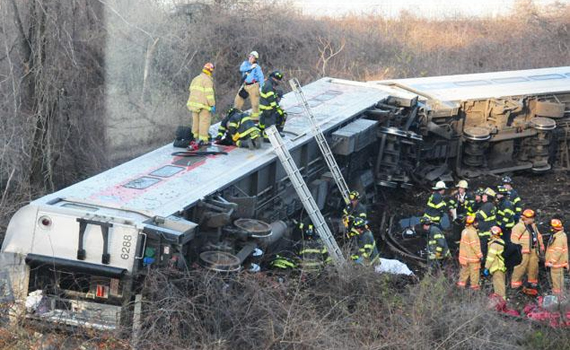
New York, Dec 2: A suburban New York train derailed on Sunday, killing at least four people and injuring 63, including 11 critically, when all seven cars of a Metro-North train ran off the tracks on a curved section of the line, officials said.
The crash happened at 7:20 a.m. about 100 yards (metres) north of Metro North's Spuyten Duyvil station in the city's Bronx borough, said Aaron Donovan, a spokesman for Metro North, a subsidiary of New York State's Metropolitan Transportation Authority (MTA).
A spokesman for the city fire department confirmed the number of dead and said 11 people were in critical condition, six were in serious condition with non-life threatening injuries and another 46 sustained minor injuries.
The train was about half full at the time of the crash, with about 150 passengers, the MTA said.
"On a workday, fully occupied, it would have been a tremendous disaster," New York City Fire Commissioner Salvatore Joseph Cassano told reporters at the scene.
At least one rail car was lying toppled near the edge of a river and police.
New York Police Department divers were seen in the water near the scene of the accident, and dozens of firefighters were on the scene helping pull people from the wreckage. None of the passengers were in the water, according to Marjorie Anders of Metro-North.
The derailment was the latest in a string of problems this year for Metro North, the second busiest U.S. commuter railroad in terms of monthly ridership.
In July, 10 cars of a CSX freight train carrying trash derailed in the same vicinity, Anders said. Partial service was restored four days later, but full service did not return for more than a week.
In May, a Metro-North passenger train struck a commuter train between Fairfield and Bridgeport, Connecticut, injuring more than 70 people and halting service on the line.
The MTA said Sunday's accident marked the first customer fatality in Metro North's three-decade history and that it was a "black day" for the railroad.
After touring the scene, New York Governor Andrew Cuomo said officials from the National Transportation Safety Board were traveling to the scene and would conduct a thorough investigation.
"We think everybody is accounted for, we've gone over the site a number of times," Cuomo said, adding his thoughts and prayers were with the dead and injured.
The MTA said details about how the accident would impact the morning commute on Monday were not yet available.
Amtrak said its Empire Line Service between New York City and Albany was being restored after being halted immediately after the crash. Amtrak's Northeast Corridor service between Boston and Washington is not affected.
Those injured were being transported to area hospitals, said New York City Fire Department spokesman Michael Parrella. A center for passengers' family members has been set up at JFK High School in the Bronx.
The train was a diesel with seven cars. The locomotive was on the north end pushing the cars southward.
This train was not scheduled to stop at the Spuyten Duyvil station and was headed toward Grand Central terminal in Manhattan, the MTA said.






Comments
Add new comment